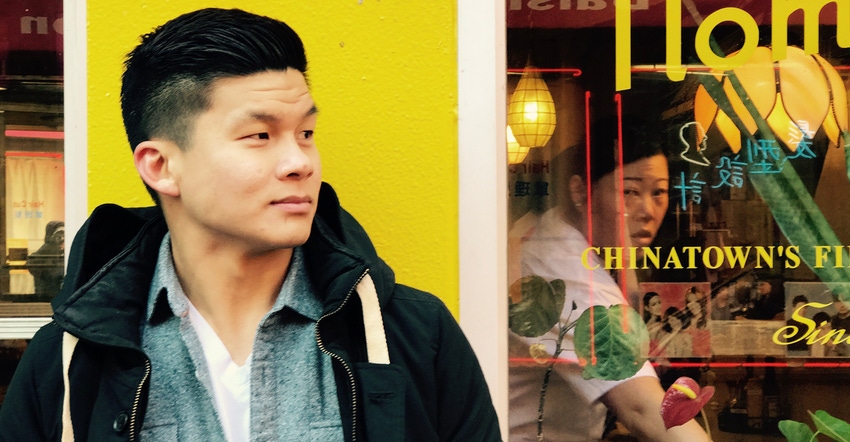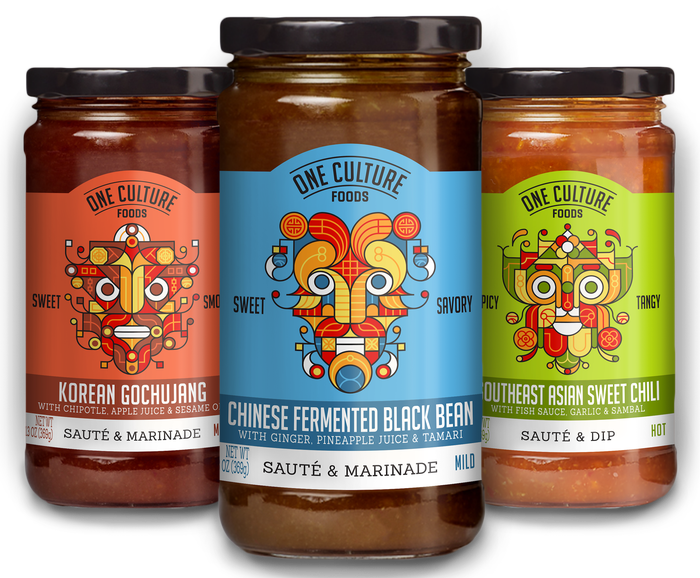Moving away from his California home convinced Hansen Shieh that the rest of the country needed authentic but healthy Asian flavors in their kitchens.

Growing up in the San Gabriel Valley of Los Angeles, Hansen Shieh enjoyed a variety of delicious regional Asian cuisines, from those his grandmother made to what local restaurateurs offered in non-descript strip malls and other holes-in-the-wall nearby. After a short, unfulfilling and soul-sucking career in finance, the 32-year-old realized that his passion for food and the exciting times in the food industry could combine for a new career.
In 2015, Hansen started One Culture Foods with three flavors of sauté and marinades. He is adding a line of four noodle bowls—Vietnamese beef pho, Taiwanese beef noodles, Chinese chicken noodle and Japanese spicy ramen—all made with bone broth reduction. We recently caught up with him by email to learn how his background and his passion inspired his quest to share Asian cultures through natural foods.
What inspired you to become a natural foods entrepreneur?
Hansen Shieh: I have always had an affinity for big, bold, in-your-face flavors and I wanted to create something that would allow me to share some of those flavors and foods with as many people as possible. I didn’t know how lucky I was until after living in different parts of the country and realizing that most people don’t know what real Chinese or Korean or Thai or Vietnamese food really is.
What does “one culture” mean to you? How do you share that meaning through food?
HS: To me it means the inclusiveness of some universal languages—food being a major one. We hope to be a small reminder that we are all more similar than we are different. As a brand, we aren’t afraid to push the boundaries in terms of complementary flavors sometimes, but everything we do is rooted in heritage. It is inspired by a food memory or a flavor or ingredient that deserves broader appeal—Chinese fermented black bean being the prime example.
What was your first product, and what prompted you to take it to market?
HS: Black bean sauce. I’ve always loved it and couldn’t believe there wasn’t a delicious, natural black bean sauce already on the market. I obsessed over delivering something that was respectful to the hero ingredient that let it shine but also delivered on the other notes as well—sweet, acid, bitter, etc. It’s by far our best-seller.
Why did you decide to enter the natural foods market instead of conventional foods?
HS: Growing up and watching my grandma cook with whole foods, going to [University of California,] Berkeley for college and learning about Alice Waters and the Slow Food Movement, and living in New York during the peak (for now) health and wellness craze. It’s pretty incontrovertible that eating as naturally as is available is good for you. First and foremost, food needs to be delicious, period—
How are your products different than conventional products in your category?
HS: Our ambition separates us: pushing the boundaries on flavors and culinary delivery, while keeping things natural and convenient. We never bring to market something that someone else is already doing unless we feel like we can push the envelope and provide value to the consumer.
What was the first store to sell your product? How did you get that store to carry your brand?
HS: It was a tiny corner store in Brooklyn called Bed-Stuy Fresh and Local, run by this dude named Dylan. It was my first stop of my very first sales run. I knew the sauces delivered, so my whole approach was don’t [mess] it up and get them to at least try it. Once they try them, the pitch becomes much easier.
When did you begin selling online? How do your e-commerce sales compare to your brick-and-mortar sales?
HS: We set up an Amazon store and online store on our website early. As a millennial consumer, I knew that retail was moving online and that it would be a matter of time for grocery to follow suit. Online sales are still a small percentage of wholesale sales, but it allows us to have a direct relationship with our customers and get our products to people in parts of the country where we don’t have wholesale distribution yet.
What prompted your new design and packaging?
HS: The branding evolution of One Culture is a tangible manifestation of my personal evolution of what I want One Culture to be and say. We are young, bold and ambitious while, at the same time, drawing inspiration and having the ultimate respect for heritage and tradition. I think the current branding helps us say that.
You recently introduced bone broth noodle cups. What’s next for One Culture Foods?
HS: We have a lot of ideas in the pipeline, but we need to establish ourselves with what we have now. The early success of the sauces helped us establish the ground game and has allowed us to gain the pulse of the industry and spot an opportunity with the noodle cups. We are extremely bullish on the noodle cup line’s potential to make big gains and take us to the next level.
What trends do you see coming in your category?
HS: We’ll continue to see all categories move up the convenience spectrum. You’ll continue to see the adoption and embrace of unique, “exotic” flavors and foods. The rest of the world is a treasure trove of amazing food, techniques and ideas and creative food entrepreneurs will continue to find ways to deliver them in ways that fit American consumers’ preferences and lifestyles.
About the Author(s)
You May Also Like




